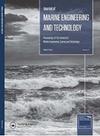利用废热热电能对压载水进行膜脱盐
IF 4.4
4区 工程技术
Q1 Engineering
Journal of Marine Engineering and Technology
Pub Date : 2020-10-06
DOI:10.1080/20464177.2020.1827487
引用次数: 4
摘要
压载水管理和处理是海洋工业的一个持续问题,包括小型和散货船、游轮、客船和货船。在区域、国家和国际层面实施了一些法规,以最大限度地减少与港口不当处理受污染压载水有关的环境影响。在这项研究中,提出了一种对环境无害的方法来管理船舶压载水。从主机废热中获得的热电能被认为是反渗透脱盐过程的主要能源,该过程以清洁水的形式回收压载水,为船舶提供淡水供应。通过一个案例研究来阐述所提出的方案。还讨论了海水温度和能量回收方案对淡水生产率的影响。所提出的方案为压载水管理提供了一种很有前途的方法,同时允许提供现场处理,使其在航运运营中受益。本文章由计算机程序翻译,如有差异,请以英文原文为准。
Membrane desalination of ballast water using thermoelectric energy from waste heat
Ballast water management and treatment is an on-going issue for marine industry including small and bulk carriers, cruise ships, passenger ships and cargo vessels. Several regulations are implemented at regional, national and international levels to minimise the environmental impacts related to improper disposal of contaminated ballast water at ports. In this study, an environmentally benign approach for managing the ballast water on marine vessels is proposed. Thermoelectric energy harvested from main engine’s waste heat is considered as a primary source of energy for a reverse osmosis desalination process, which recovers the ballast water in the form of clean water to provide for fresh water supplies in ships. A case study is presented to elaborate the proposed scheme. The effects of seawater temperatures and energy recovery schemes on the freshwater production rates are also discussed. The proposed scheme provides a promising approach to ballast water management while allowing to provide in situ treatment for its beneficial use in shipping operations.
求助全文
通过发布文献求助,成功后即可免费获取论文全文。
去求助
来源期刊

Journal of Marine Engineering and Technology
工程技术-工程:海洋
CiteScore
5.20
自引率
0.00%
发文量
0
审稿时长
>12 weeks
期刊介绍:
The Journal of Marine Engineering and Technology will publish papers concerned with scientific and theoretical research applied to all aspects of marine engineering and technology in addition to issues associated with the application of technology in the marine environment. The areas of interest will include:
• Fuel technology and Combustion
• Power and Propulsion Systems
• Noise and vibration
• Offshore and Underwater Technology
• Computing, IT and communication
• Pumping and Pipeline Engineering
• Safety and Environmental Assessment
• Electrical and Electronic Systems and Machines
• Vessel Manoeuvring and Stabilisation
• Tribology and Power Transmission
• Dynamic modelling, System Simulation and Control
• Heat Transfer, Energy Conversion and Use
• Renewable Energy and Sustainability
• Materials and Corrosion
• Heat Engine Development
• Green Shipping
• Hydrography
• Subsea Operations
• Cargo Handling and Containment
• Pollution Reduction
• Navigation
• Vessel Management
• Decommissioning
• Salvage Procedures
• Legislation
• Ship and floating structure design
• Robotics Salvage Procedures
• Structural Integrity Cargo Handling and Containment
• Marine resource and acquisition
• Risk Analysis Robotics
• Maintenance and Inspection Planning Vessel Management
• Marine security
• Risk Analysis
• Legislation
• Underwater Vehicles
• Plant and Equipment
• Structural Integrity
• Installation and Repair
• Plant and Equipment
• Maintenance and Inspection Planning.
 求助内容:
求助内容: 应助结果提醒方式:
应助结果提醒方式:


